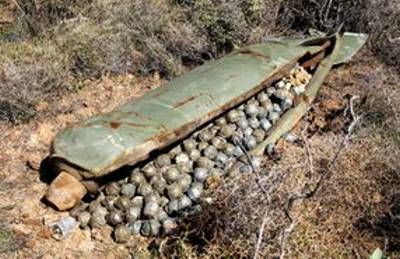36 African countries condemn use of cluster bombs
Lomé /New York, 24 May 2013 – A delegation of 36 African countries meeting in Togo has condemned the continued use of cluster bombs worldwide and urged all African nations to sign up to an international ban.
A statement issued today at a seminar organized in the capital, Lomé, with the support of the United Nations Development Programme (UNDP) and the Government of Norway, says that African states are gravely concerned about the global “recent and on-going use of cluster munitions as well as by their effects,” and that the use of these weapons “has led to mounting numbers of victims, including women and children.”
At the seminar, representatives of 36 African governments met with civil society campaigners and the International Committee of the Red Cross to discuss the universalization of the Convention on Cluster Munitions.
The statement goes on to urge the immediate discontinuation of the use of cluster bombs and calls on African countries that have not yet done so to join the Convention on Cluster Munitions, an international agreement signed by 112 countries (of which 83 have ratified) to ban the use, production, stockpiling and transfer of cluster munitions and provide assistance to victims. Twelve African nations are yet to join the convention.
Cluster munitions are explosive devices contained in larger canisters that, when released mid-flight, spread across a broad area, delivering a series of small explosions. According to the Coalition on Cluster Munitions, they have been used in at least 24 countries and three territories in recent decades and unexploded cluster bombs remain a serious hazard and impediment to development in many post conflict societies.
“Besides the indiscriminate nature of these weapons and the high probability that they can harm civilians, cluster bombs are also highly likely to fail to detonate,” said Blaise Narteh-Messan, First Secretary of the Permanent Mission of Togo to the United Nations in Geneva, and Co-Chair of the meeting. “In some cases, this leaves thousands of tonnes of ordnance in the ground, posing a deadly threat to farmers, children and anyone using the land – sometimes for decades.”
The purpose of the seminar was to further extend the reach of the convention throughout Africa, and help African states considering ratification or accession to overcome the challenges they face.
Although this is a global problem, 14 African nations are believed to have a cluster bomb problem, making it one of the most affected continents, and African states played a strong role in getting the treaty off the ground and signed in Oslo in 2008.
Twenty three African nations have signed and ratified the convention into law, and nineteen more have signed it but have not yet ratified the document. “We urge the twelve African countries that have not yet signed the CCM to become States Parties at the earliest opportunity,” said Narteh-Messan.
The Lomé seminar is a key opportunity for African governments to make progress ahead of the Fourth Meeting of States Parties to the Convention on Cluster Munitions (4MSP) taking place in Lusaka, Zambia from 09-13 September 2013. It was organized by the government of the Republic of Togo in cooperation with the governments of Ghana and Zambia and supported by the government of Norway and the United Nations Development Programme (UNDP).
Angola, Chad, Democratic Republic of the Congo, Eritrea, Ethiopia, Libya, Mauritania, Mozambique, Sierra Leone, Somalia, South Sudan, Sudan, Uganda and Zambia, have been affected by cluster munitions in Africa alone. Their most recent use in Africa was in 2012 in South Sudan.
About the Convention on Cluster Munitions:
The Convention on Cluster Munitions bans the use, production, stockpiling and transfer of cluster munitions and requires countries to clear affected areas within 10 years and destroy stockpiles of the weapon within eight. The Convention includes groundbreaking provisions requiring assistance to victims and affected communities. Signed in Oslo in December 2008, the Convention entered into force as binding international law on 1 August 2010 and is the most significant international disarmament treaty since the 1997 Mine Ban Treaty banning antipersonnel landmines.
As of 24 May 2013, 112 have signed the CCM of which 83 have ratified, the latest one having ratified being Iraq on 14 May 2013.
UNDP partners with people at all levels of society to help build nations that can withstand crisis, and drive and sustain the kind of growth that improves the quality of life for everyone. On the ground in 177 countries and territories, we offer global perspective and local insight to help empower lives and build resilient nations.
UNDP Newsroom
Stay with Sierra Express Media, for your trusted place in news!
© 2013, https:. All rights reserved.






